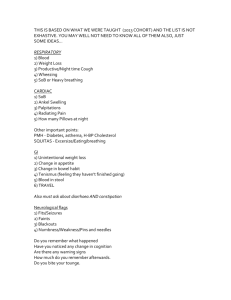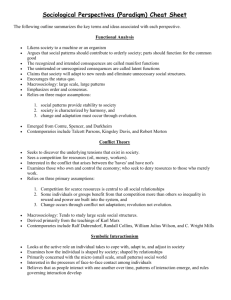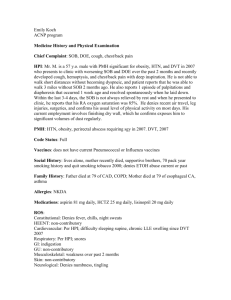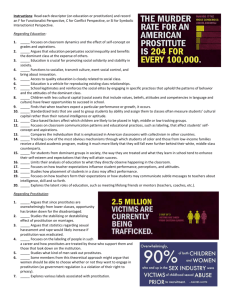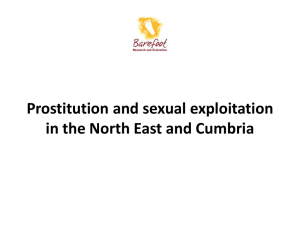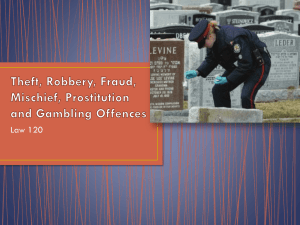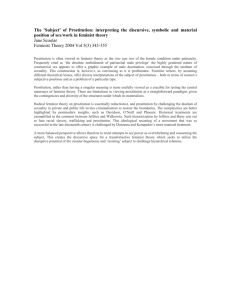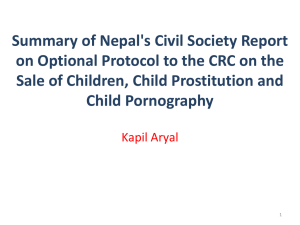Zoning of Sexually Oriented Businesses
advertisement
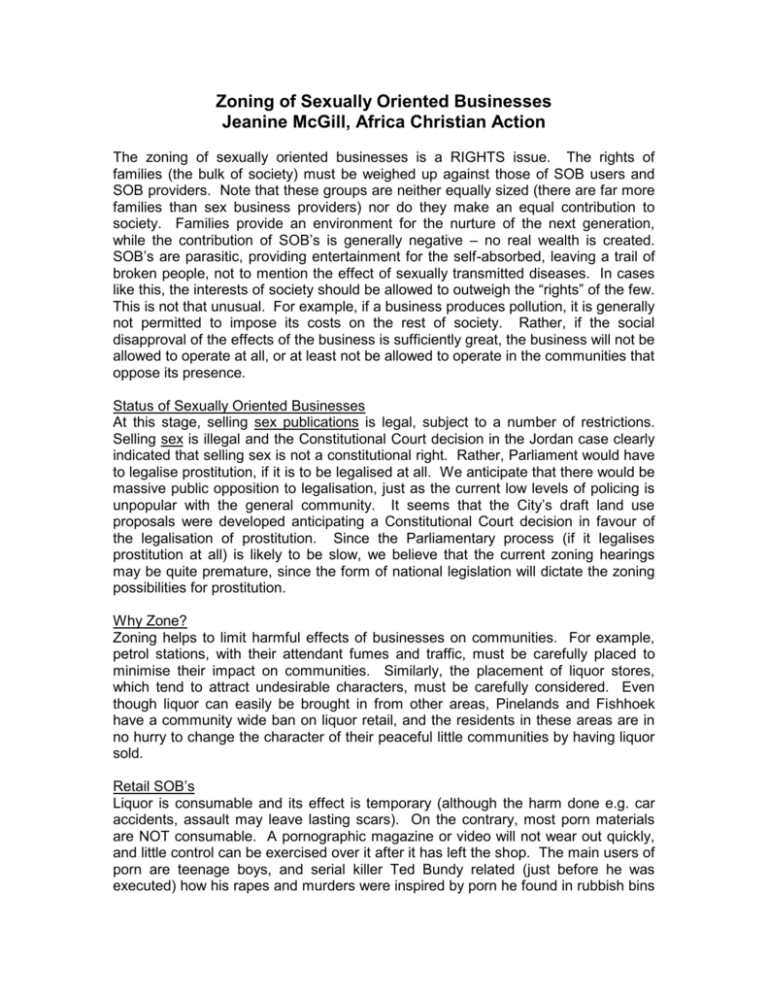
Zoning of Sexually Oriented Businesses Jeanine McGill, Africa Christian Action The zoning of sexually oriented businesses is a RIGHTS issue. The rights of families (the bulk of society) must be weighed up against those of SOB users and SOB providers. Note that these groups are neither equally sized (there are far more families than sex business providers) nor do they make an equal contribution to society. Families provide an environment for the nurture of the next generation, while the contribution of SOB’s is generally negative – no real wealth is created. SOB’s are parasitic, providing entertainment for the self-absorbed, leaving a trail of broken people, not to mention the effect of sexually transmitted diseases. In cases like this, the interests of society should be allowed to outweigh the “rights” of the few. This is not that unusual. For example, if a business produces pollution, it is generally not permitted to impose its costs on the rest of society. Rather, if the social disapproval of the effects of the business is sufficiently great, the business will not be allowed to operate at all, or at least not be allowed to operate in the communities that oppose its presence. Status of Sexually Oriented Businesses At this stage, selling sex publications is legal, subject to a number of restrictions. Selling sex is illegal and the Constitutional Court decision in the Jordan case clearly indicated that selling sex is not a constitutional right. Rather, Parliament would have to legalise prostitution, if it is to be legalised at all. We anticipate that there would be massive public opposition to legalisation, just as the current low levels of policing is unpopular with the general community. It seems that the City’s draft land use proposals were developed anticipating a Constitutional Court decision in favour of the legalisation of prostitution. Since the Parliamentary process (if it legalises prostitution at all) is likely to be slow, we believe that the current zoning hearings may be quite premature, since the form of national legislation will dictate the zoning possibilities for prostitution. Why Zone? Zoning helps to limit harmful effects of businesses on communities. For example, petrol stations, with their attendant fumes and traffic, must be carefully placed to minimise their impact on communities. Similarly, the placement of liquor stores, which tend to attract undesirable characters, must be carefully considered. Even though liquor can easily be brought in from other areas, Pinelands and Fishhoek have a community wide ban on liquor retail, and the residents in these areas are in no hurry to change the character of their peaceful little communities by having liquor sold. Retail SOB’s Liquor is consumable and its effect is temporary (although the harm done e.g. car accidents, assault may leave lasting scars). On the contrary, most porn materials are NOT consumable. A pornographic magazine or video will not wear out quickly, and little control can be exercised over it after it has left the shop. The main users of porn are teenage boys, and serial killer Ted Bundy related (just before he was executed) how his rapes and murders were inspired by porn he found in rubbish bins 2 etc. in his community as a child. In addition, porn desensitises the mind, and severe spousal abuse can result as partners experiment with the perverted possibilities. There are no barriers to the movement of materials after they have left the shop, and a magazine bought in Claremont can end up in Claremont, Khayelitscha or King William’s Town. Since retail SOB’s have a far more serious effect on the community that the much maligned liquor stores, we appeal to the zoning board to restrict retail SOB’s as far as possible. This can be done, for example, by restricting the number allowed in the city. We currently have far more retail SOB’s than a decent city needs. In addition, we appeal for community consent to be required for a retail SOB to be established. This consent should not only consider the adjacent communities, but also the access corridors involved, since this material spreads so easily. We would recommend that zoning permission not be granted if the community within 5 km disapproves, or if the business is in the access paths to schools. Entertainment SOB’s These include adult film theatres, strip clubs, review bars, adult cabarets etc. In Cape Town, many of these businesses are found in the Sea Point area. The aim is to sexually stimulate the patrons and the result is obvious – sexually aroused patrons degrade the area surrounding the SOB by using street prostitution, urinating in public, and sexually harassing passersby. Crime and drugs are attracted by these businesses. Noise and alcohol problems can also result. We urge the zoning committee to keep such SOB’s well away from residential areas, as well as tourist attractions. Having traveled overseas I can assure the committee that it is no delight to be accosted by such patrons while innocently passing through an area, or looking at sites of historical or cultural interest. My male friends report similar problems of being accosted by prostitutes. “Personal services” SOB’s These include massage parlours and escourt agencies. They are basically a euphemism for prostitution. Residential areas must be protected from such “businesses”. We also appeal for policing - STD’s are spread in such centres, men waste family money and break their marriages. Prostitution is still illegal – euphamistic “services” should not be given kid-glove treatment. Wynberg and Claremont Wynberg has a huge street prostitution problem, with about 40 female and 5 male prostitutes. The police find that the laws are difficult to enforce and their attempts to crack down merely moves the problem elsewhere, e.g. Sea Point. On the other hand, Claremont has no street prostitution. The police recognise that street prostitution is associated with crime and any infringements are clamped down on immediately. The Claremont police are also very responsive to community complaints re SOB’s. There is a retail SOB - Adult World – in Claremont. The police report that there are no problems in the immediate area, no doubt due to their very strict policing of street prostitution, but as argued earlier, that does not mean that the material is not having a long lasting destructive effect elsewhere. 3 In Wynberg, Ebor Road is the indoor sex capital. Even though it is a very short road, it hosts a number of SOB’s. There is a licensed “massage parlour” at number 35. The parlour leads to parking problems, since patrons park on the opposite panel beater’s property to avoid being associated with the parlour. The “customer” we saw leaving had parked at the panel beater’s and looked very sheepish ... Investigations revealed that unlicensed “Nigerian” prostitution activity had caused another panel beater to move out, since the obvious comings and goings were distracting to the panel beater’s staff, and off-putting to customers, presenting a very poor image. We heard reports of child prostitution having been practised in parking lot opposite the massage parlour, and discovered an unlicenced shebeen at the top of the road. It seems that even though the massage parlour was licenced, the “area” attracted other, illegal and harmful SOB’s. The social problems experienced in Wynberg lead us to urge that IF “Sex Work” is legalised, NO street prostitution (except perhaps in front of one’s own property) be permitted at all. Residents have reported used condoms, urination and defacation, tissues (to wipe the body fluids away after a customer), needles and disruption due to noise as a result of fighting. Reasonable use requires that prostitutes and their clients not be allowed to impose costs on others. Similarly, we urge that NO residential prostitution be permitted. The recent Observatory case clearly indicates that residents do not appreciate such neighbours. Should prostitution then be allowed in industrial areas? As the Wynberg panel beater’s experience shows, such “businesses” can be quite disruptive to their neighbours. They can also cause parking problems, even if sufficient bays are available, since the patrons feel shame. Just as such businesses degrade a residential area, they degrade an industrial area, presenting an unprofessional image. We urge that the zoning board require the consent of adjacent businesses. “Sex Work” Requirements If the City is serious about protecting tourists, any future legal sex work, as well as the current massage parlours and escourt agencies, should be subject to strict requirements. There should be at least one shower per prostitute, as well as sufficient toilets and cleaners available during the working hours. Linen should be changed between customers and there should be parking bays for each worker, as well as for each client. The “business” needs to be clearly signposted and marked, to prevent harassment of neighbours, and a receptionist should be available to let customers in so that they do not loiter if they should arrive early for an appointment. If we believe that South African children have a better future than prostitution, we need to keep SOB’s well out of residential areas, to avoid promoting negative role models. We also recommend a system of registration, as can be found in any South African hotels. If proof of identity is required for both patrons and prostitutes, underage persons can be kept out, tourists can be protected, crime can be reduced and if STD’s are discovered, this system can help trace sexual contacts to curb the epidemic. Other Recommendations Local government is charged with promoting environmental quality. The Constitution 4 (s 22) says that trade may be regulated by law. We thus urge the City to use the full force of the means available to it by regulating SOB’s with regard to formal/informal trading, public nuisance, street trading, traffic, parking and the health of public places. Consent Use Finally, we would like to urge the zoning board to adopt consent use as a requirement for granting zoning. Consent is not necessarily restrictive, it’s just democratic. If no communities (including industrial areas) want to give consent, perhaps there’s something wrong with the “business”. Just because it’s legal doesn’t mean it’s a right. Businesses have no right to impose their “externalities” on others. The zoning of sexually oriented businesses is a RIGHTS issue. The rights of families (the bulk of society) must be weighed up against those of SOB users and SOB providers. Note that these groups are neither equally sized (there are far more families than sex business providers) nor do they make an equal contribution to society. Families provide an environment for the nurture of the next generation, while the contribution of SOB’s is generally negative. The interests of society should be allowed to outweigh the “rights” of the few. If a business produces pollution, it is generally not permitted to impose its costs on the rest of society. If the pollution is sufficiently bad, the business should not be allowed to operate at all, or at least not be allowed to operate in the communities that oppose its presence. Jeanine McGill National Co-ordinator Africa Christian Action PO Box 36129, Glosderry, 7702 e-mail info@christianaction.org.za Web www.christianaction.org.za Tel (021) 689 4481 Fax (021) 685 5884
